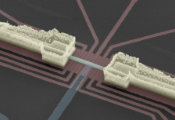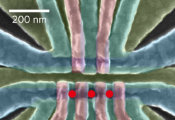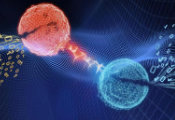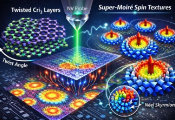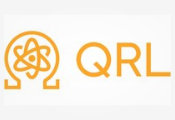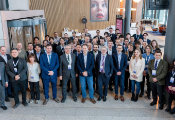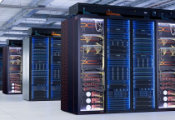Will 2025 Be the Year of Quantum Breakthroughs?
April 14, 2025 -- Exactly 100 years ago, in 1925, the term “quantum mechanics” was used for the first time in a scientific publication. To mark that moment and raise awareness about the potential of quantum today, the UN has declared 2025 as the “International Year of Quantum Science and Technology.”
“Incredible progress in science and engineering is allowing us to use quantum mechanics for developing revolutionary new technologies in areas such as computing, communications, and measurement, which could lead to significant contributions to society,” says Prof. Vincenzo Savona, head of the EPFL Laboratory of Theoretical Physics of Nanosystems and Academic Director of the EPFL Center for Quantum Science and Engineering (QSE).
One of the most appealing quantum technologies is quantum computing, which uses the peculiar phenomena of quantum mechanics – quantum superposition and entanglement – to potentially solve complex problems that are beyond the abilities of current classical computers.
Other technological applications of quantum mechanics are quantum simulation, which uses a highly controlled quantum system to simulate another one, quantum cryptography, which uses quantum key distribution for enhanced security in data transfer, and quantum sensing, which can improve the accuracy and sensitivity of measurements in a variety of applications, including the detection of magnetic fields from the brain and seismic activity.
“It's very appropriate that the year of quantum would fall now, as the field is seeing exciting developments in experimental implementations,” says Prof. Thomas Vidick, head of the Quantum Complexity and Cryptography Laboratory who joined EPFL in 2024. “The first small scale fault-tolerant quantum computations might very well be announced this year, which would mark a major milestone for the field.”
“A lot of exciting perspectives”
Quantum research at EPFL is vast and growing quickly. Some of the many breakthroughs in quantum from EPFL include developing enabling technologies for quantum computing, advanced experiments of quantum simulation with ultra-cold atoms, exploration of hybrid technology platforms for quantum computing, quantum materials or quantum photonics, and cutting-edge research on quantum algorithms which could open new avenues for quantum computing.
“Quantum research at EPFL has been growing at a fast rate in recent years, and it now covers many of the exciting perspectives open in quantum science,” says Prof. Jean-Philippe Brantut, head of the Laboratory of Quantum Gases who works on quantum simulation. “This has gone hand-in-hand with the growing interest by students and the development of education programs to train the next generation of quantum scientists.”
In 2021, EPFL created its master’s program in Quantum Science and Engineering, along with a minor, to train the next generation of quantum researchers and engineers. The program now has 69 students and is growing. As part of their degree, QSE master’s students do internships in world leading companies in quantum, such as Alice & Bob, ID Quantique, and IBM, among others.
EPFL students in quantum also learn how to apply what they learn to societal issues. For the past two years, selected master’s students have participated in the NYU Abu Dhabi Quantum Hackathon for Social Good, and in spring 2025, a new course on sustainability specific to quantum will begin. It will include guest lectures on SDGs and related quantum use cases, as well as ethical aspects.
Quantum for society
As part of EPFL’s focus on bringing applications of quantum technology to the wider public, Savona is working with the Geneva Science Diplomacy Anticipator (GESDA) and the Open Quantum Institute (OQI) on developing a use case for quantum computing to achieve SDG 2 – Zero Hunger. And EPFL is working with the OQI to help provide access to quantum computing in lower income countries, as well as to people outside of academia.
“Quantum technology and education should not be limited to people in certain countries, or only those with master’s or PhDs,” says Dr. Philippe Caroff, executive director of the QSE Center.
The School also helps bring quantum to society by incubating startups, such as Qanova Tech from EPFL researcher Dr. Simone Frasca, which was awarded a Quantum Innogrant in 2024. The QSE Center also provides funding and assistance to new potential startups through its QSE Innovation Seed Grants.

